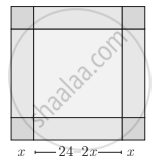Advertisements
Advertisements
प्रश्न
Which sets of ordered pairs represent functions from A = {1, 2, 3, 4} to B = {−1, 0, 1, 2, 3}? Justify.
{(1, 2), (2, −1), (3, 1), (4, 3)}
उत्तर
Let f = {(1, 2), (2, −1), (3, 1), (4, 3)}
f is a function because every element of A is related to one and only one element of B.
APPEARS IN
संबंधित प्रश्न
Which of the following relations are functions? Give reasons. If it is a function, determine its domain and range.
- {(2, 1), (5, 1), (8, 1), (11, 1), (14, 1), (17, 1)}
- {(2, 1), (4, 2), (6, 3), (8, 4), (10, 5), (12, 6), (14, 7)}
- {(1, 3), (1, 5), (2, 5)}
What is the fundamental difference between a relation and a function? Is every relation a function?
et A = (12, 13, 14, 15, 16, 17) and f : A → Z be a function given by
f(x) = highest prime factor of x.
Find range of f.
If f : R → R be defined by f(x) = x2 + 1, then find f−1 [17] and f−1 [−3].
If \[f\left( x \right) = x^3 - \frac{1}{x^3}\] , show that
If f(x) = (a − xn)1/n, a > 0 and n ∈ N, then prove that f(f(x)) = x for all x.
Write the domain and range of the function \[f\left( x \right) = \frac{x - 2}{2 - x}\] .
Let f and g be two functions given by
f = {(2, 4), (5, 6), (8, −1), (10, −3)} and g = {(2, 5), (7, 1), (8, 4), (10, 13), (11, −5)}.
Find the domain of f + g
If f : Q → Q is defined as f(x) = x2, then f−1 (9) is equal to
If f(x) = cos (log x), then the value of f(x2) f(y2) −
f is a real valued function given by \[f\left( x \right) = 27 x^3 + \frac{1}{x^3}\] and α, β are roots of \[3x + \frac{1}{x} = 12\] . Then,
The range of the function \[f\left( x \right) = \frac{x}{\left| x \right|}\] is
If f(m) = m2 − 3m + 1, find f(−3)
If f(x) =` (2x−1)/ (5x−2) , x ≠ 2/5` Verify whether (fof) (x) = x
If f(x) = `{(x^2 + 3"," x ≤ 2),(5x + 7"," x > 2):},` then find f(0)
If f(m) = m2 − 3m + 1, find f(− x)
Find x, if g(x) = 0 where g(x) = `(5x - 6)/7`
Find x, if f(x) = g(x) where f(x) = `sqrt(x) - 3`, g(x) = 5 – x
Find the domain and range of the following function.
f(x) = `sqrt(16 - x^2)`
Check the injectivity and surjectivity of the following function.
f : N → N given by f(x) = x3
Express the following exponential equation in logarithmic form
e–x = 6
If `log((x + y)/3) = 1/2 log x + 1/2 logy`, show that `x/y + y/x` = 7
Answer the following:
Solve for x, logx (8x – 3) – logx 4 = 2
Answer the following:
Find value of `(3 + log_10 343)/(2 + 1/2 log_10 (49/4) + 1/2 log_10 (1/25)`
Answer the following:
Find the domain of the following function.
f(x) = `sqrt(x - 3) + 1/(log(5 - x))`
Answer the following:
Find the domain of the following function.
f(x) = x!
Answer the following:
Find the range of the following function.
f(x) = 1 + 2x + 4x
Given the function f: x → x2 – 5x + 6, evaluate f(x – 1)
An open box is to be made from a square piece of material, 24 cm on a side, by cutting equal square from the corner and turning up the side as shown. Express the volume V of the box as a function of x

The data in the adjacent table depicts the length of a person's forehand and their corresponding height. Based on this data, a student finds a relationship between the height (y) and the forehand length (x) as y = ax + b, where a, b are constant.
| Length ‘x’ of forehand (in cm) |
Height 'y' (in inches) |
| 35 | 56 |
| 45 | 65 |
| 50 | 69.5 |
| 55 | 74 |
Find a and b
The data in the adjacent table depicts the length of a person's forehand and their corresponding height. Based on this data, a student finds a relationship between the height (y) and the forehand length (x) as y = ax + b, where a, b are constant.
| Length ‘x’ of forehand (in cm) |
Height 'y' (in inches) |
| 35 | 56 |
| 45 | 65 |
| 50 | 69.5 |
| 55 | 74 |
Find the height of a person whose forehand length is 40 cm
Find the domain of the following function.
f(x) = [x] + x
Find the domain of the following functions given by f(x) = x|x|
Let f(x) = `sqrt(x)` and g(x) = x be two functions defined in the domain R+ ∪ {0}. Find `(f/g)(x)`
Find the domain and range of the function f(x) = `1/sqrt(x - 5)`
If f(x) = y = `(ax - b)/(cx - a)`, then prove that f(y) = x.
The domain for which the functions defined by f(x) = 3x2 – 1 and g(x) = 3 + x are equal is ______.
The domain of the function f(x) = `1/sqrt(|x| - x)` is ______.
Range of the function f(x) = `x/(1 + x^2)` is ______.
